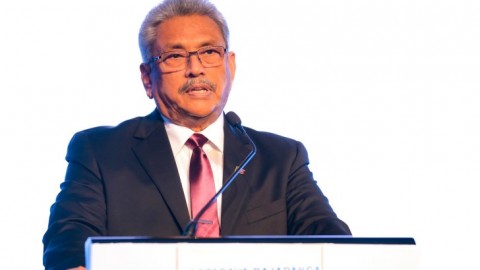
President proposes to establish a regional mechanism to coordinate issues related to sustainability…
Provide assistance to vaccination programmes of underprivileged countries.
– President urges all nations that can support.
- Existing climate issue is one of the most difficult challenges humankind must overcome.…
- President explains urgent need for strict control over maritime transport of hazardous and environmentally sensitive materials.…
- Countries in the region need proper coordination to curb human trafficking, drug trafficking, religious extremism and terrorism…
President Gotabaya Rajapaksa emphasized that everyone in the region should work together to revive the economy after the COVID-19 pandemic situation.
The President made these remarks delivering the Inaugural Address at the Indian Ocean Conference (IOC) held in Abu Dhabi, the capital of the United Arab Emirates (UAE), yesterday (04).
The measures taken worldwide to combat the pandemic, although they proved invaluable in saving countless lives, came at a steep cost. The rapid decline in economic activity these measures caused have had serious long-term consequences on global travel, trade, and economic growth. The President pointed out that developing countries in particular have been very badly impacted by this and that this can only be achieved through the support provided by richer nations to developing countries.
The President said the COVID-19 pandemic will not end until everyone, everywhere is inoculated against the virus and requested the nations with capabilities to provide assistance to underprivileged nations to make their vaccination drives productive.
In contrast to the leadership provided by the World Health Organisation (WHO) for the global pandemic response, no world institution has stepped forward to help countries navigate their economic recovery. Although the pandemic has affected rich and poor countries alike, a disproportionate impact is borne by poorer countries.
The President pointed out that the economies that are already burdened with external debt obligations are facing hardships and therefore, it would be greatly appreciated if more action could be taken by wealthy nations as well as multilateral organisations to forgive, restructure, or grant moratoria for the debt repayments of poorer countries struggling in the wake of the pandemic.
As the pandemic has shown, adverse situations in one country can quickly have ramifications on the wider region and eventually on the globe itself. That is why the countries across the region and the world at large must work together to solve problems that affect nations, whether in terms of epidemics, economy, or ecology. The President said the ongoing climate crisis is perhaps the most difficult challenge that humanity needs to overcome.
The X-Press Pearl disaster was not an isolated incident. The fire on board the MT New Diamond was successfully doused through concerted efforts. The President pointed out that both these incidents point towards the urgent need for stricter controls surrounding the oceanic transport of hazardous and environmentally sensitive materials.
Extra-territorial fishing by well-equipped trawlers is another significant problem in the region that affects the livelihoods of poor communities that rely on local fishing for their sustenance. The President said coordinated action to mitigate such issues will be critical in sustaining the overall ecology and the viability of local economies in the Indian Ocean region in the future and proposed the establishment of a regional mechanism to coordinate such issues relating to sustainability.
While stating that it must be admitted that the Indian Ocean region is also the location of considerable criminal activity, including human smuggling, drugs smuggling, and terrorism, President Rajapaksa said narcotics trafficking remains a significant problem for countries in this region and that this can only effectively be dismantled through coordinated efforts between the intelligence services, Coast Guards and Navies of regional countries. The President pointed out similar coordination and cooperation will be required to contain human trafficking and said such coordination will also be required to counter the threat posed by religious extremism and terrorism in countries in the region. The President said extremist and terrorist ideology can spread with ease from nation to nation unless carefully monitored and suppressed.
The first Indian Ocean Conference commenced in 2016 with the objective of discussing issues of common interest and concerns to countries in the Indian Ocean region and other countries using the Indian Ocean. The Fourth Summit was held in the Maldives in 2019 and the theme was “Securing the Indian Ocean Region: Traditional and Non-Traditional Challenges”.
The theme of IOC 2021 is “Ecology, Economy, Epidemic”.
In his Special Address to the forum, Foreign Minister of Oman Sayyid Badr Bin Hamad Bin Hamood Al Busaidi said President Gotabaya Rajapaksa paved the way for a productive discussion that can act as a platform for effective multilateral action across the Indian Ocean. The Omani Foreign Minister further said we need to take steps today to conserve the extraordinary beauty and biodiversity of the ocean for our future generations and crucially reverse the damage already done through overfishing and pollution.
External Affairs Minister of India S. Jaishankar said Indian ocean nations are called upon today to take greater responsibilities, create better relationships and display more initiatives. He also said in his Keynote Address that we need to expeditiously normalise travel through certification recognition so that the livelihoods affected by the COVID-19 pandemic are restored.
Foreign Ministers representing 18 countries and more than 200 delegates from over 40 countries are attending the conference.
Full text of the speech
Your Excellencies
Distinguished Invitees
Ladies and Gentlemen
It gives me great pleasure to welcome all of you to the 5th Indian Ocean Conference.
At the outset, I take this opportunity to thank the India Foundation, the S. Rajaratnam School of International Studies of Nanyang Technological University Singapore, and the Institute of National Security Studies of Sri Lanka, together with the organising committee, for their efforts for this event.
The Indian Ocean Conference provides an invaluable opportunity for countries in the region as well as our partners to deliberate on the critical issues affecting us.
The theme of this year’s conference centres on three topics, “Ecology, Economy, Epidemic”, that deserve our utmost attention and deepest consideration.
As we meet here today, the most immediate and significant of these is the continuing impact of the COVID19 pandemic on the world at large.
When the COVID-19 virus started spreading around the world in the first quarter of 2020, it posed a serious challenge to all nations.
For perhaps the first time in history, humanity had the sophistication and the resources to actively identify, inhibit, and even try and prevent the widespread devastation of a global epidemic before it was too late.
Urgent actions to save lives were taken by nearly all countries.
These included border closures, lockdowns, and testing, as well as isolating and treating those infected while rapidly tracing their contacts and quarantining them before the virus spread to the wider population.
The able leadership provided by the World Health Organisation during this time was vital in coordinating a global response to this new threat.
The cooperation between nations in the early stages of the pandemic, including sharing data and technical expertise, supporting capacity building in healthcare systems, and financial assistance was truly laudable.
Together with the selfless service rendered by healthcare personnel, scientists, and essential workers around the world, this international cooperation helped humanity through this pandemic.
Sri Lanka took action to curb the spread of the virus very early on.
A national task force involving all key stakeholders within and outside Government was set up to oversee our pandemic response.
After closing borders in late March last year, Sri Lanka imposed a full national lockdown for several weeks to contain the spread of the virus before reopening after bringing transmissions down to near zero.
Other state organs outside the Health Ministry played significant roles in supporting the healthcare system at this time.
The military rapidly constructed new quarantine centres and treatment facilities; managed our quarantine programme, and together with the police, helped public health officials with contact tracing.
This freed healthcare personnel to focus on the medical aspects of our pandemic response.
The Government also supported citizens affected by the lockdown, including grants of cash and dry rations to daily wage earners and those on social welfare schemes.
Even after Sri Lanka reopened after the first lockdown, strict public health measures including mask wearing and social distancing remained in place.
Regional as well as countrywide lockdowns were reimposed whenever new waves of infections spread in the country.
Sri Lanka’s last lockdown ended in October 2021, after which the country has slowly returned to normalcy.
This was enabled by the outstanding success of our vaccination programme.
We have now vaccinated 85% of all over the age of 16 with two doses of a COVID19 vaccine, with 98% having received one dose.
This rapid roll-out of vaccines was facilitated by the military, which set up and operated vaccination centres including mobile services throughout the country to help protect our public in record time.
We greatly appreciate the generosity of India, China, the United States of America, and Japan, all of whom donated vaccines to us either directly or through COVAX, which augmented the larger quantity Sri Lanka purchased from manufacturers on commercial terms.
At the same time, it is a matter of concern that the relatively slow rollout of vaccines in some parts of the world has resulted in the emergence of a potentially devastating new variant of the virus that needs to be carefully monitored in the days and weeks to come.
If existing vaccines are in fact less effective against this new Omicron variant, the world may soon return to square one with border closures and other restrictions including lockdowns imposed once again, with potentially catastrophic consequences.
I therefore call upon nations that have the wherewithal to do so, to support the vaccination drives of less wealthy countries more effectively.
The COVID19 pandemic will not end until everyone, everywhere is inoculated against the virus.
This can only be achieved through far reaching cooperation between nations, and particularly through the support provided by richer nations to developing countries.
Such cooperation will also be necessary to support the global economic recovery following the pandemic.
The measures taken worldwide to combat the pandemic, although they proved invaluable in saving countless lives, came at a steep cost.
The rapid decline in economic activity these measures caused have had serious long-term consequences on global travel, trade, and economic growth.
Developing countries in particular have been very badly impacted.
The loss of revenue from tourism, the loss of foreign exchange remittances from expatriate workers, and the loss of export earnings have been especially devastating.
When combined with the high public expenditure necessary for healthcare and social welfare programmes, as well as the fiscal and monetary policies needed to support economic revival, many developing nations including Sri Lanka now find themselves in a very difficult situation.
Countries that had taken on significant external debt to fund their development programmes are particularly badly affected, with very little reserves available to meet debt repayment obligations.
Sadly, in contrast to the leadership provided by the WHO for the global pandemic response, no world institution has stepped forward to help countries navigate their economic recovery.
Intergovernmental groups, regional blocs, multilateral organisations and individual countries that could have assumed such a role on behalf of the global economy have not done so.
This is unfortunate.
Although the pandemic has affected rich and poor countries alike, a disproportionate impact is borne by poorer countries.
Absorbing or compensating for the loss of revenue from tourism as well as the loss of foreign remittances from expatriate workers overseas due to the economic consequences of the pandemic, is not easy for smaller economies.
It is especially hard for economies that are already burdened with external debt obligations.
It would therefore be greatly appreciated if more action could be taken by wealthy nations as well as multilateral organisations to forgive, restructure, or grant moratoria for the debt repayments of poorer countries struggling in the wake of the pandemic.
This kind of support would greatly help those countries in their time of need, and more broadly, assist a speedier global recovery.
I hope that such support would be forthcoming in the future.
As the pandemic has shown, adverse situations in one country can quickly have ramifications on the wider region and eventually on the globe itself.
That is why the countries across the region and the world at large must work together to solve problems that affect nations, whether in terms of epidemics, economy, or ecology.
In this context, the ongoing climate crisis is perhaps the most difficult challenge that humanity needs to overcome.
As the recent United Nations Climate Conference has shown, achieving truly global consensus on this critical issue is difficult.
Nevertheless, global action on limiting deforestation, curbing use of fossil fuels, preventing overexploitation of finite resources, and increasing use of renewable energy is essential.
As a developing island nation that is very vulnerable to climate change, Sri Lanka is deeply aware of these dangers.
Adverse weather patterns caused by climate change have already affected the country on several occasions in the past decade.
There is every likelihood that the impact of these phenomena will worsen in time to come.
We must act now before it is too late.
Sri Lanka has been active on the global stage in response to the ongoing climate crisis.
In 2019, the Colombo Declaration on Sustainable Nitrogen Management was formulated to support the target of halving harmful nitrogen waste globally by 2030.
Sri Lanka is a co-lead of the Energy Compact for No New Coal Power, and leads the Action Group on Mangrove Restoration in the Commonwealth Blue Charter Initiative.
At the national level, my government has pledged to increase the contribution of renewable energy sources to our power requirements to 70% by 2030.
We have prioritised enhancing national forest cover and we hope to strengthen our carbon sequestration capacity by 7% between now and 2030.
Sri Lanka also aims to achieve carbon neutrality by 2050.
The use of artificial fertiliser is strongly discouraged, and our policy is to support the rapid development of organic agriculture within the country in future.
A range of policy actions is also required on ecological issues that are related to but distinct from climate change.
Earlier this year, the container ship X-Press Pearl caught fire off the coast of Colombo, Sri Lanka.
Despite concerted efforts by the Sri Lanka Navy, Air Force, and Coast Guard together with Indian Naval and Coast Guard vessels, the fire continued for several days, and the ship ultimately sank, off Sri Lankan waters.
Enormous environmental damage was caused by this incident.
Hazardous chemicals including nitric acid and other toxic substances, as well as several tonnes of oil and plastic resin pellets from spilled cargo, were released into the ocean.
The resulting pollution prevented fishing and adversely affected the livelihoods of thousands in our seaboard communities for months and may continue to pose significant danger to marine life in the long term.
The X-Press Pearl disaster was not an isolated incident.
Less than a year before it occurred, another significant maritime disaster was only narrowly averted.
The fire on board the MT New Diamond, which was transporting a large quantity of crude oil near our waters, was successfully doused through concerted efforts by Sri Lanka’s Navy and Air Force, with support from India as well as two Russian Naval vessels in the region at the time.
Both these incidents point towards the urgent need for stricter controls surrounding the oceanic transport of hazardous and environmentally sensitive materials.
Similar controls also need to be imposed on overfishing and ecologically damaging practices including bottom trawling, long-line fishing and blast fishing in the Indian Ocean region.
These practices severely deplete fish stocks, result in wasteful bycatch of marine species, and cause devastation to other organisms that are critical to sustaining marine ecosystems.
Extra-territorial fishing by well-equipped trawlers is another significant problem in the region that affects the livelihoods of poor communities that rely on local fishing for their sustenance.
Coordinated action to mitigate such issues will be critical in sustaining the overall ecology and the viability of local economies in the Indian Ocean region in the future.
I therefore propose the establishment of a regional mechanism to coordinate such issues relating to sustainability.
Another critical area of focus for countries in the Indian Ocean Region and our global partners is security.
A considerable proportion of the world’s trade in commodities and manufactured goods takes place through the Indian Ocean region.
Maintaining the integrity of its sea lines of communication is therefore of utmost importance to the global economy.
In this context, however, it must be admitted that the Indian Ocean region is also the location of considerable criminal activity, including human smuggling, drugs smuggling, and terrorism.
These are all major issues that need to be addressed.
Narcotics trafficking remains a significant problem for countries in this region.
Sri Lanka has spent considerable effort over the past several years on intercepting shipments of narcotics including heroin, ice, and cannabis by criminal networks that operate in its waters.
These are truly transnational networks whose different aspects are overseen by criminal operatives from various nations.
Often, the leaders of a particular drug network are based in one nation, while the drugs they traffic in are produced in a different country and transported by persons of various nationalities to yet other countries around the region.
Due to the complex, transnational nature of these networks, they can only effectively be dismantled through coordinated efforts between the intelligence services, Coast Guards and Navies of regional countries.
Further improving intelligence sharing and cooperation within the region is therefore critically important to curbing this threat.
Similar coordination and cooperation will be required to contain human trafficking, which has become a lucrative business for criminal operatives in this region.
Sri Lanka has been used in past years both as a source and as a transit point for illegal migration to Oceania.
However, this activity has by now been largely curbed through close cooperation between the Sri Lankan and Australian Governments.
This is a very good example of what can be achieved through greater coordination between countries.
As we go forward, such coordination will also be required to counter the threat posed by religious extremism and terrorism in countries in the region.
As Sri Lanka’s experience with the devastating Easter Sunday attacks of 2019 has shown, this problem too is not one that can be contained to any specific locality.
Extremist and terrorist ideology can spread with ease from nation to nation unless carefully monitored and suppressed.
The only way to do this is through intelligence sharing and other forms of inter-governmental action, which I strongly advocate for.
I am confident that with greater international cooperation, countries in our region will be able to better withstand all the challenges that they face in terms of ecology, economy and epidemics.
I trust that over the forthcoming sessions, participants will have fruitful dialogue on these issues.
I hope that they will be able to arrive at a broader understanding on what we, as nations in the region, can do collectively towards resolving our common issues.
I assure you that Sri Lanka will fully cooperate in any regional mechanisms proposed to meaningfully accomplish this.
I have utmost confidence that no matter how challenging these issues may be, we can overcome them successfully if we approach them together in a spirit of true cooperation and goodwill.
Thank you.
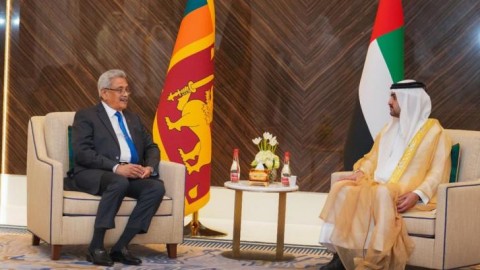
A meeting between President Gotabaya Rajapaksa and the Deputy Ruler of Dubai and Deputy Prime Minister and Minister of Finance Sheikh Maktoum bin Mohammed bin Rashid Al Maktoum, was held in Expo 2020 premises, today (04).
The two leaders stated that the meeting would strengthen the friendship between the two countries. The President also took this opportunity to extend congratulations for the 50th National Day of the United Arab Emirates.
The President apprised the Deputy Prime Minister on the progress of the COVID-19 control initiatives and the vaccination drive as well as regarding the future plans of the economic development amidst COVID-19.
President Rajapaksa said that the Expo stall would help to showcase Sri Lanka’s culture and identity to the world and expressed gratitude to Dubai for their support.
The President also joined the Expo 2020 at the invitation of the Deputy Prime Minister.
192 countries are participating in the “Expo” exhibition which is being held in a 1,083-acre desert area. The exhibition which commenced on October 1 under the theme ‘Connecting Minds and Creating the Future’ will be running until 31 March 2022. According to the organizers, more than 03 million people from all over the world have come to witness the exhibition.
President Rajapaksa visited the United Arab Emirates Stall and signed the guest book kept there for special guests.
Meanwhile, in a significant incident, the President met with the Vice President and Prime Minister of the United Arab Emirates Sheikh Mohammed bin Rashid Al Maktoum while visiting the Sri Lankan Exhibition stall. The President also took this opportunity to brief the Prime Minister on the investment opportunities available in Sri Lanka as well as regarding the trade and cultural relations.
The Expo 2020 exhibition is expected to boost Sri Lanka’s tourism industry and a number of export sectors, including tea and apparel.
Principal Advisor to the President Lalith Weeratunga and Ambassador Malraj de Silva accompanied the President on this visit to Expo 2020.
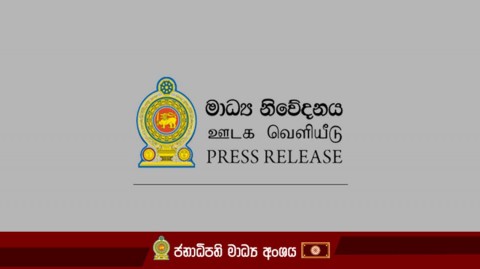
- 113 already arrested …
- Will ensure the confidence placed by the Sri Lankan Government and the people in the Government of Pakistan that justice will be served.…
- Long-standing friendship and trust between the two countries will never be harmed…
Pakistan’s Prime Minister Imran Khan has assured President Gotabaya Rajapaksa that the perpetrators of the brutal murder of Sri Lankan professional Priyantha Kumara, who worked at a factory in Pakistan, will be brought to justice.
In a telephone call to the President, the Prime Minister of Pakistan stated that the long-standing friendship and trust between the two countries will never be compromised.
All the videos and information related to the incident have been obtained by the Pakistani security forces. The Pakistani Prime Minister said that 113 suspects have already been arrested and the search for the remaining suspects is ongoing.
The Prime Minister of Pakistan informed the President that Priyantha Kumara, a Sri Lankan who had served in Pakistan for a long time, had shown a high level of professionalism as a manager.
The Prime Minister further stated that the perpetrators have no mercy from God and they will not be given any pardon by the law as well. The Prime Minister also said the confidence placed by the Government and the people of Sri Lanka that justice will be meted out and maximum punishment will be given to the perpetrators, will be ensured.
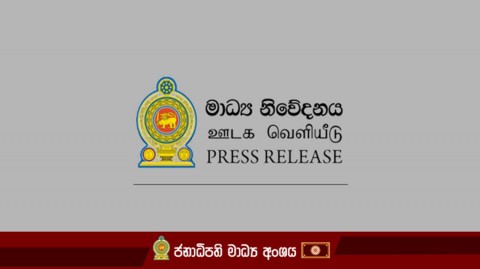
I am deeply saddened by the brutal assassination of Priyantha Kumara, a Sri Lankan professional who worked at a factory in Pakistan. This act of barbarism is a great shock to the Sri Lankans as well as to all those across the world who value humanity.
As an ardent friend of Pakistan, Sri Lanka commends the actions taken by the Government of Pakistan led by Prime Minister Imran Khan to ensure justice, immediately after this brutal assassination. The Sri Lankan Government and the people of Sri Lanka look forward with great confidence on the future steps that will be taken by the Government of Pakistan in this regard.
I also urge the Government of Pakistan to ensure the safety of all other Sri Lankans living in Pakistan.
The Foreign Ministry and the Sri Lankan High Commission in Pakistan are currently taking action based on the instructions given by Prime Minister Mahinda Rajapaksa and I on the immediate course of action to be taken upon hearing of the incident.
Extremist activities of any nature create grave chaos in a society. Therefore, such incidents further confirm that the world must act with the same objective when taking action against extremism.
I wish to remind that I, the Government and the Sri Lankan people are with Mr. Priyantha Kumara’s family members who are deeply saddened and shocked by this unfortunate incident.
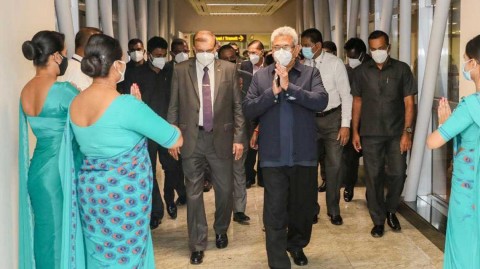
President Gotabaya Rajapaksa left the country today (03) to attend the Indian Ocean Conference (IOC) to be held in Abu Dhabi, the capital of the United Arab Emirates (UAE).
The President who arrived at the Passenger Terminal of the Bandaranaike International Airport, Katunayake to leave the country engaged in cordial discussion with the passengers.
The first Indian Ocean Conference commenced in 2016 with the objective of discussing issues of common interest and concerns to countries in the Indian Ocean region and other countries using the Indian Ocean. The Fourth Summit was held in the Maldives in 2019 and the theme was “Securing the Indian Ocean Region: Traditional and Non-Traditional Challenges”.
The Indian Ocean Conference will be held from 4 – 5 December in Abu Dhabi and the theme of IOC 2021 is “Ecology, Economy, Epidemic”. The inaugural address will be delivered by President Gotabaya Rajapaksa.
Foreign Minister Prof. G.L. Peiris and the Principal Advisor to the President Lalith Weeratunga are accompanying the President on this visit.
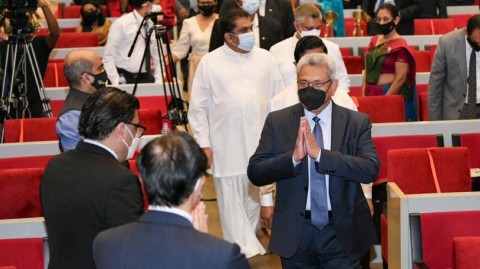
Policy interventions require that may be unpopular…
– President
President Gotabaya Rajapaksa said that in the future too many unpopular decisions will have to be taken to overcome the global economic challenges and to keep the country on the path to prosperity. Even though the people criticized these interventions, the country and the people would reap the benefits in the near future, the President said.
“I urge you to recognise and understand that these measures are being imposed because we have little other choice in our present situation,” the President further said.
The President made these remarks addressing the ‘Presidential Export Awards Ceremony’ held at the BMICH, today (26).
The Presidential Export Awards (PEA) initiated by the Export Development Board in 1981, and this marked the 24th Awards Ceremony.
This is the highest and most exclusive award an exporter can receive in Sri Lanka and the Presidential Awards are given to exporters who have made the highest contribution to the development of the export sector.
This year, 63 outstanding export companies of Sri Lanka received the awards for the financial years 2019/20 and 2020/21. The award winners were selected by a panel of judges chaired by a retired Supreme Court judge.
The President appreciated the commitment and the courage of exporters that they had to remain in the export sector in the face of COVID-19 epidemic.
A number of new Awards such as ‘Best Exporter in Product Diversification,’ ‘Best Value Added Exporter of the Year,’ ‘Best Performing Exporter in Emerging Markets’ and ‘Emerging Exporter of the Year’ as well as new sectoral awards were introduced at this year’s ceremony.
The President presented 24 awards.
‘Several policy interventions, however, such as the restrictions on certain imports in place since last year, have had beneficial consequences. They have created space for new local industries to develop. It is essential that these new industries are fostered intelligently’, President Rajapaksa said.
‘Instead of short-term profiteering through reducing quality and creating artificial shortages, these new industries should strive to create quality products that could become globally competitive. This will be to everybody’s benefit’, the President added.
‘There are, therefore, significant opportunities for investments into organic fertiliser, organic agricultural production and processing, and for fostering new export markets for this produce. Infusing more technology to increase agricultural productivity and improve traceability will also create further value that will benefit our economy in the long run,’ the President said.
‘I strongly encourage you to explore such opportunities that can generate great long-term value to you while also benefitting our nation’, the President further said.
Assuring that the issues in the export sector would be resolved expeditiously, the President said that the government and the private sector should work hand in hand to achieve the goals of the export sector.
Trade Minister Bandula Gunawardana said that steps will be taken to promote the export sector under a clear export development plan from next year.
The Minister pointed out that the role played by those engaged in the export sector in the midst of many challenges during the global economic crisis has helped to protect the country’s economy and added that he would like to pay tribute to all exporters.
Cabinet and State Ministers, Secretaries to Ministries and other public officials, investors in the trade and export sectors were also present.
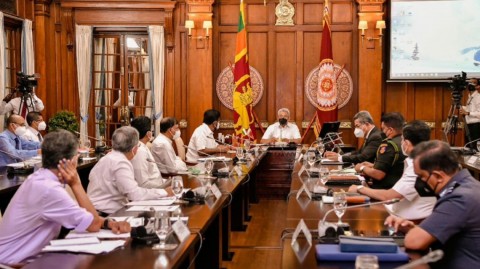
- Molnupiravir tablet for COVID-19 patients
- Booster dose to all those over the age of 20 with non-communicable diseases…
- More focuses on controlling the spread of coronavirus in rural areas …
President instructs
President Gotabaya Rajapaksa has instructed the health authorities to take necessary steps to launch a mobile vaccination service to administer a booster dose for people over the age of 60 who had their second dose three months prior.
The President gave these instructions at the meeting of the Special Committee on COVID-19 Control today (26).
It was decided to administer the booster dose to all those over the age of 60 who come to the hospital medical clinics.
It was also decided to give the third dose to all those over the age of 20 who have received the second dose of the covid vaccine and suffering from non-communicable diseases. Accordingly, the third dose of the vaccine will be given to cancer patients, persons who are undergoing cancer treatment, transplant patients, hemorrhagic patients, and all those patients with weakened immune systems due to a non-communicable disease.
Director General of Health Services Dr. Asela Gunawardena said the personnel in these categories could obtain the third dose at the respective clinic or at the Office of the Medical Officer of Health (MOH) in the area every Saturday.
The topic of providing Molnupiravir tablet which is being prescribed in several countries including in the UK to the Covid-19 infected patients was discussed at the meeting. The President instructed State Minister Prof. Channa Jayasumana to take steps to import the relevant medicinal drugs through the State Pharmaceutical Corporation in the same manner the Covid vaccines were brought down.
The lack of concern among the people in rural areas about the Covid risk and the urgent actions that need to be taken to control the virus spread in these areas and to educate the people were also discussed.
Health Minister Keheliya Rambukwella, State Ministers Sisira Jayakody and Channa Jayasumana, Health Ministry Secretary Major General Dr. Sanjeewa Munasinghe and Commanders of the three Armed Forces, the Inspector General of Police and other officials were also present at the meeting.
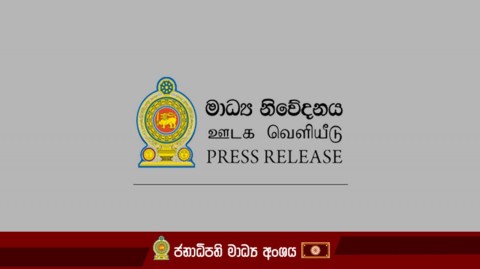
– Says Assistant Secretary General Khaled Khiari
The United Nations will always work closely with Sri Lanka, said Mr. Khaled Khiari, UN Assistant Secretary General for Political, Peacebuilding and Peace Operations.
Mr. Khiari made these remarks when he met with President Gotabaya Rajapaksa at the Presidential Secretariat, today (25).
UN Assistant Secretary General Khiari is visiting Sri Lanka as a follow-up to the bilateral meeting with the President and the UN Secretary- General Antonio Guterres held in September this year on the sidelines of the 76th Session of the UN General Assembly. Mr. Khiari conveyed the best wishes of UN Secretary- General Guterres to President Rajapaksa and said that the UN is willing to engage in a constructive and positive engagement with Sri Lanka.
Expressing satisfaction over the President’s affection and interest in the environment, the Assistant Secretary General appreciated Sri Lanka’s commitment to achieving the Millennium Development Goals.
The President explained that steps are being taken to plant 100,000 mangroves with the assistance of the Navy and actions are being taken to prevent climate change through environmental conservation programmes.
President Rajapaksa expressed gratitude to the UN agencies and donors that have assisted Sri Lanka through the COVAX facility to make the vaccination drive successful and in facing other challenges in the face of the COVID-19 epidemic.
The President pointed out that the government’s development programme implemented in the North and East after the end of the war in 2009 had brought about rapid development. The President recalled his invitation made while participating in the UN General Assembly to the diaspora to work together with all communities after visiting Sri Lanka. The President said that he hoped that the invitation would be met with positive initiatives.
The two sides exchanged views on unity and relations between communities. An environment where all communities can live freely has been made available in Sri Lanka. The President pointed out that the Minister of Justice is from the Muslim community, the Attorney General is from the Tamil community and many of those holding other key posts are of different communities. President Rajapaksa said the government has undertaken a great task in building unity among the communities and therefore, no one should have any doubt in this regard.
Both sides were of the view that education was fundamental to unity among the communities.
President Rajapaksa said that the process by which South Africa has been able to end apartheid and move forward will be studied and the lessons that can be learned from it and what can be implemented will be looked into. The President also expressed hope that the United Nations will provide assistance in this regard.
Resident Coordinator of the United Nations in Sri Lanka Hanaa Singer-Hamdy, Political Officer at the UN Peace Operations Department’s Political and Peacebuilding Affairs Department Chiaki Ota, Secretary to the President P.B. Jayasundera and Principal Advisor to the President Lalith Weeratunga were also present.

Presidential Commission has recommended that former President, PM and the Cabinet should be held responsible for the Easter Attack. Law can be enforced against them by an Act of Parliament…
- Sustainable solutions to all issues for the progress of the country…
- Infrastructure development to continue uninterrupted…
- All the promised projects will be completed if there are no lockdowns…
– says President.
“Golden Gate Kalyani” is a symbol of Japan-Sri Lanka Friendship…
Will continue to support Sri Lanka…
– Ambassador of Japan Mizukoshi Hideaki.
The Presidential Commission of Inquiry (PCoI) into the Easter Sunday attacks appointed by the previous Government has made recommendations that the then government, including the former President, Prime Minister and the Cabinet should be held responsible for the attack. It has been referred to the Parliament, the Attorney General, and the CID to take further actions. President Gotabaya Rajapaksa said that through an Act of Parliament, law can be enforced against the culprits revealed by the Commission.
The government has the two-thirds majority (2/3) required for this purpose. Therefore, the President urged the Opposition to be vigilant when making demands and not to deceive the people.
The President made these remarks addressing the ceremony held to declare open the “Golden Gate Kalyani,” which was constructed with advanced technology, on Wednesday evening (24).
After the opening of the New Kelani Bridge by the President and Prime Minister Mahinda Rajapaksa, both leaders activated the state-of-the-art lighting system set up at both sides of the bridge.
The new bridge was constructed to mitigate and ease the traffic congestion on the Kelani Bridge due to vehicles entering and leaving Colombo.
The Government of Sri Lanka and the Japan International Cooperation Agency (JICA) prepared the initial plans for the bridge in 2012 and its feasibility study was conducted in 2013. The Cabinet approved the construction of the bridge in 2014. The relevant agreements were also signed in the same year.
Construction works began in 2017 after providing houses for the affected People as well as after providing alternative places for the public and private institutions that were affected by the project. The cost of the project is Rs. 55,000 million and it took four years to complete the project.
The Bridge consists of six lanes from the entrance of the Colombo-Katunayake Expressway towards the Bandaranaike Roundabout and from that point onwards, the flyover will be four lanes towards Orugodawatte and the Ingurukade Junction. This will enable access to the elevated expressways from Ingurukade Junction to the Colombo Port City and from Orugodawatta to Athurugiriya.
It is significant that the bridge has been constructed in such a way that it does not obstruct the flow of the Kelani River and that many species of plants including Koboneela, Esala, May -Mara, Mee and Kumbuk have been planted on both sides of the main road to protect the beauty of the environment.
During the tenure of President Mahinda Rajapaksa from 2005 to 2010, a massive development took place in the country. The President assured that sustainable solutions will be provided for all other issues as well.
Despite the Covid-19 pandemic, a number of infrastructure development projects have been initiated. While stating that all these activities will continue, President Rajapaksa said that all the promised projects will be completed if there are no other lockdowns in the country in the future.
The intelligent people should always be on the alert. Do not leave any room for the lies. Highways Minister Johnston Fernando said that the Opposition should not be allowed to sabotage the development programme being carried out by the government in the face of the Covid-19 challenge.
Back then, President Mahinda Rajapaksa made all the plans to build the Kinniya Bridge, the Highways Minister said and added that he regrets the tragedy caused by the previous government’s negligence to implement the project. He said that precious lives could have been saved if the project had been implemented.
The ‘Golden Gate Kalyani’ is another symbol of Japan-Sri Lanka friendship. Japanese Ambassador to Sri Lanka Mizukoshi Hideaki stated that Japan will continue to provide assistance to Sri Lanka.
The Maha Sangha, other religious leaders, Cabinet and State Ministers, Governors, people’s representatives including Members of Parliament, Ambassadors, Foreign Representatives, Secretaries to Ministries and Government Officials attended the event.
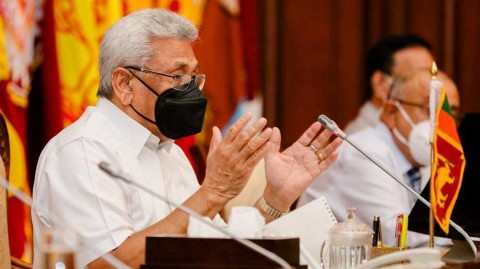
- Subsidies only for organic farming …
- Identify shortcomings and prepare for next Season …
- Farmers have not been properly educated …
- President stresses officials to dedicate themselves to do the right thing …
There is no change in government policy. President Gotabaya Rajapaksa stressed that the country’s agriculture policy is only for a green agriculture that focuses on the sole use of organic fertilizers.
President Rajapaksa said that the government will only distribute organic fertilizer and provide subsidies only for organic farming. The farmers should be properly educated. It is also vital to identify the chemical fertilizer mafia that exists when implementing this. The President emphasized that the commitment of the officials was essential to make the right policy victorious.
The President made this observation at a special discussion held at the Presidential Secretariat this morning (22) regarding the cultivation of the Maha Season and the supply of organic fertilizer.
The President inquired from officials at the district level about the cultivation of paddy and other crops in all parts of the country. The heavy rains that prevailed have reduced the yield of many crops including vegetables. Moreover, the delay in the distribution of organic manure affected the cultivation activities during the Maha Season. However, at the district level, the cultivation activities commenced in nearly 70% of the total agricultural lands, the officials said.
The President pointed out that the reason behind farmers organizing protests and delaying cultivation was that they have not been properly educated. The President expressed his displeasure to the officials for not accurately educating the farmers. The President emphasized that the officials should work to find answers on behalf of the agitating farmers in accordance with the green agriculture policy and added that there is no obstacle for the officials who do not agree with the government policy to leave.
The President also said that the support of a team that works clearly according to their conscience is needed for the success of this programme.
Minister Mahindananda Aluthgamage, State Minister Shasheendra Rajapaksa, Governors Marshal of the Air Force Roshan Goonetileke and Anuradha Yahampath, Secretary to the President P.B. Jayasundera, Principal Advisor to the President Lalith Weeratunga and Heads of the Ministry of Agriculture and its affiliated line agencies and organic fertilizer manufacturers were also present on the occasion.


